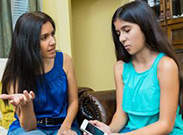|
|
 |
|
The views expressed on this page are soley
those of the author and do not
necessarily represent the views of County
News Online
|
 |
Start Talking!
Know! What’s
Hidden in Plain Sight – Part II
11/7/2017
This Know! Tip reveals some of the tools and tactics teens may use to
hide drug use. If you suspect your child is using drugs, you should
contact the Substance Abuse and Mental Health Services Administration
National Helpline at 1-800-662- HELP (4357).
Hidden in Plain Sight is a substance misuse awareness program for
parents and other adults that helps uncover signs of trouble. In a
previous tip, Know! What’s Hidden in Plain Sight - Part I, we learned
the importance of being aware of every child’s risk for drug use, and
we discovered the key role electronics play in drug-related
communications.
In continuing with information presented by Officer Ben Boruchowitz of
the Powell Police Department in central Ohio, we look at where young
people get drugs, where they hide them and what parents and other
caregivers can do to prevent use or intervene if needed.
Depending on the type of drug, young people get a hold of them most
commonly through:
Friends from school;
Home medicine cabinets that are unlocked and unmonitored;
Mid-level dealers who they meet at gas stations, restaurants and
grocery stores.
Young people hide drugs anywhere they think parents will not look,
including:
Return air vents in their room;
Cans, highlighters, pens, personal hygiene products, makeup, books,
mattresses, toilets, etc.;
Vehicles – if they are old enough to drive and if they have a car that
is only used by them.
When it comes to monitoring your child’s activities for substance
misuse prevention or if need be, intervention, Officer Boruchowitz
shares the following tips:
Lock your home medicine cabinets; get rid of expired, unused, or
unwanted medicines; and monitor your over-the-counter and prescription
medications – especially pain meds.
Know who your child is with and their whereabouts at all times.
Track your child’s cash very carefully, or take it one step further.
Instead of handing over cash to your son or daughter who plans on going
to the movies, use a preloaded debit card and then require receipts in
return.
Search your child’s room (and car – if it applies) without their
knowledge – it is your right as a parent. If you warn them you are
going to check, they will get rid of any evidence. If you search and
find nothing, consider it great news.
Search their phones and devices regularly, checking browser history,
text messaging, social media accounts, etc.
Make them provide their passwords. Reconsider allowing your child to
access Snapchat, because it is so risky.
Check your network at home for connected devices that you have not
authorized.
Don’t be afraid to use drug tests if you suspect your child may be
using drugs. In fact, some parents keep a drug test in the home. Teens
are aware that, at any given time, mom or dad could choose to do a
random drug test. The other benefit here is that this gives kids an out
when it comes to peer pressure. If offered drugs, they can say, “No
way, my parents do random drug tests. I’d be busted.”
Be aware that every child – even your child – could be influenced to
use drugs.
Let your child know you realize their peers are using and why you don’t
want them to use.
Education and open dialogue with your children about drugs is key. In
fact, children whose parents talk with them regularly about the dangers
and consequences of drug use are up to 50 percent less likely to use
them in the first place.
If you suspect your child is involved in substance abuse that is beyond
control, seek immediate intervention. You can start with your
pediatrician and they can direct you to the best help locally.
Remember to follow Start Talking! on Twitter and Like us on Facebook.
Learn how to get the drug prevention conversation started at
StartTalking.Ohio.Gov.
|
|
|
|

